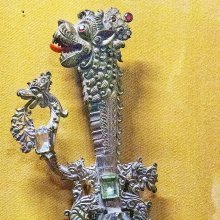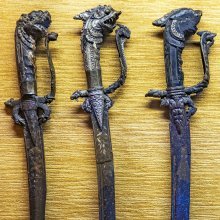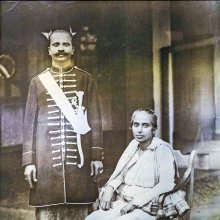Kastana, Kastāna, Kasthane, Kastane, Kasthana: 3 definitions
Introduction:
Kastana means something in the history of ancient India, Marathi. If you want to know the exact meaning, history, etymology or English translation of this term then check out the descriptions on this page. Add your comment or reference to a book if you want to contribute to this summary article.
Images (photo gallery)
India history and geography
Source: Wikipedia: India HistoryKastane is a short traditional ceremonial or decorative single-edged Sri Lankan sword. The sword is featured in the Flag of Sri Lanka. Kastanes (or Kasthanes) often have elaborate hilts, especially shaped and described as a rich mythical style inherited from Buddhism in blending a variety of Icons including, Lions, Kirtimukha Serapendiya, Nagas, crocodile/human monsters and other dragon and gargoyle like effigies. Some appear seemingly emitted onto the hand guard and cross guard with Vajra style pseudo-quillons whose finials are also decorated by minor monsters and a rain-guard decorated by the Makara or Serapendiya peacock tail or fish scales which occasionally flows over and onto the blade at the throat.

The history of India traces the identification of countries, villages, towns and other regions of India, as well as mythology, zoology, royal dynasties, rulers, tribes, local festivities and traditions and regional languages. Ancient India enjoyed religious freedom and encourages the path of Dharma, a concept common to Buddhism, Hinduism, and Jainism.
Languages of India and abroad
Marathi-English dictionary
Source: DDSA: The Molesworth Marathi and English Dictionarykastāna (कस्तान) [or कस्तन, kastana].—n (kutsita Bad,tṛṇa Grass.) Dry and loose rubbish; old thatch-grass and leaves. 2 A tightening or fastening cord; a cartrope &c.
Source: DDSA: The Aryabhusan school dictionary, Marathi-Englishkastana (कस्तन).—n Dry and loose rubbish; a cart-rope.
--- OR ---
kastāna (कस्तान).—n Dry and loose rubbish; a cart-rope.
Marathi is an Indo-European language having over 70 million native speakers people in (predominantly) Maharashtra India. Marathi, like many other Indo-Aryan languages, evolved from early forms of Prakrit, which itself is a subset of Sanskrit, one of the most ancient languages of the world.
See also (Relevant definitions)
Ends with: Kerakastana, Punjikastana, Shushkastana.
Full-text: Kerakastana, Kastara.
Relevant text
No search results for Kastana, Kastāna, Kasthane, Kastane, Kasthana; (plurals include: Kastanas, Kastānas, Kasthanes, Kastanes, Kasthanas) in any book or story.


